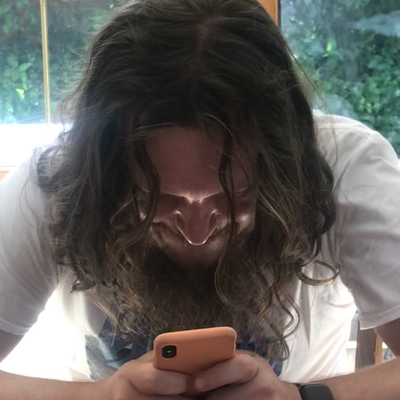This article gets so close but it feels like it goes right past the actual point.
Profit motivated tech companies are weaponising psychology to dominate your time. There’s nothing stopping them from turning your reward system against yourself. Plus given this time is generally being spent on passive consumption, of course people are gonna end up dumber—brains need exercise just like the rest of your body.
Regulation is basically the only way to remedy this (beyond actually nationalising these organisations) and unfortunately it’s gonna have to be American regulation for the most part, which I’m not gonna hold my breath for under the next administration
I just don’t see any way to regulate this without violating the Constitution.
It’s a really tough thing.
Just like with hashish? Oops
You mean because of Freedom of Speech? I think it’s not that hard; your freedom ends where someone else’s freedom begins. Propaganda and advertising for example are designed to force you into believing something / thinking in ways that you wouldn’t, so you are effectively cut off from thinking and believing like you would have been doing without that pressure.
To add to your point, we already restrict or ban certain types of advertising.
That probably depends on which constitution you’re talking about ;)
But I wonder if “for-profit organization may not use recommendation algorithms” would be constitutional in e.g. EU countries.
An independent NGO or watchdog kind of regulatory body staffed by psychology and technology experts with the legislative teeth to issue cease notices with meaningful fines to back them up (take the GDPR penalties as inspiration) should a media platform implement a harmful user experience.
It would be important that the organisation is protected from lobbying interests and direct control from the elected politicians. Though obviously its existence would hinge on the corresponding legislation being persisted.
The result will be a couple of big fines and then everyone else will play ball
If you want to witness the last vestiges of human intellect swirling down the drain, hold your nose and type the words “skibidi toilet” into YouTube.
This is the first sentence. Ohhh the danger of skibidi toilet!!! So dumb. Who takes this boomer crap seriously? lol.
Bonus points for linking to their old (citationless) article about email. It just shows how they roll out this nonsense every couple years with the latest tech.
And if you browse through the actual studies mentioned, they don’t actually say what this article claims. It’s a conflation of “doom scrolling” (unscientific) with various internet addictions, etc. where the studies are fairly vague.
I hate it too. Kids have always had dumb media and that’s fine. I don’t think all those flash games and animations harmed anyone.
Yes, well, my spoon is too big.
FOR THE LOVE OF GOD AND ALL THAT IS HOLY, MY ANUS IS BLEEDING!
Gerbil in a blender. ‘Nuf said.
DEEP CUTS damn I flashbacked hard
Wasn’t it a frog that would insult you?
Oh god! You’re right!
Gerbil in a microwave from Joe cartoon
Hahaahhahahah!!! I TOTALLY forgot about that swf hahahahahah classic!
Dang, that is a sweet earth you might say.
WROUNGG
While the article is crap, the phenomena of “brain rot” does exist. The brain is like a muscle in this regard; if you never challenge it, it deteriorates. There’s even links to increased chance for neurodegenerative sicknesses in such cases. But we have this at least since TV, it’s nothing new with the internet.
I do miss the days when I could fully read a news article or a book without flicking through to the next thing, or even watch a tv show or movie without feeling compelled to reach for my phone.
BS I can totally hold my attention longer th
Old people yelling at the cloud, as is tradition for every single generation before and likely many to follow.
This „Badger badger badger” song was the funniest shit ever when I was young. The only difference is that this one was an Adobe Flash applet while the new stuff is high definition video since we have more bandwidth now.
We have never had machine learning algorithms that exploit human psychology to give precisely timed hits of dopamine. Algorithms that know you better than your family members do.
I think in the near future we’re gonna be looking at the modern social medias similar to how we see smoking cigarettes today. Addictive and bad for you.
Every single generation fixates on something new ones do because they’re scared of change. I was endlessly derided for many things that are norm now. They were supposed to end the world but somehow we keep on going. I see my generational peers turning into own parents and dooming about Skibidi toilet thing. They forgot they were children once too.
One difference I see is that unlike before, the older generations are also caught in the attention shortening dopamine trap.
It used to be parents complaining about kids watching TV while reading the newspaper. Now adults are watching 3 minute YouTube videos just like children.
Y’all talking about dopamine just sound silly. That’s not actually what dopamine is. It’s just pseudo-science to sell grifts like happy pills and violent control of the internet.
Did you read the article you linked?
"More recent research shows that dopamine has less to do with the experience of pleasure and more to do with anticipating or craving something. "
“Create checks and balances for time spent in unhealthy behavior loops (e.g., social media scrolling, online shopping, online gambling).”
I didn’t claim it was pleasure but addiction like gambling.
Scared of change? This is not just change - we have never had social media algorithms putting shit into people’s head about themselves and others, all day, every single day.
This shit is affecting people’s entire perception of the world and who they are. It’s not just some random change.
I haven’t forgotten being a kid. But when I was growing up, the so called dangers were computer games and too much TV. That was nothing compared to weaponized algorithms picking content that will “engage” people (make them react).
Some kids today are completely out there with pluto man. They just lost any sense of reality. Their entire perception of the world is from social media algorithms from tech companies. That’s one scary thought.
Sure it’s funny with “old man yelling at the cloud”, but there is something here to be concerned about.
„We have never had x” is the exact same argument that could be used to a number of things that sparked moral outrages before. This is too much of a dejavu for me to treat seriously.
we have never had social media algorithms putting shit into people’s head about themselves and others, all day, every single day.
We still don’t. There are no algorithms putting shit into my head. I choose to use certain apps because I enjoy them, find them useful, etc. I do this when I want, definitely not all day everyday unwillingly. Is it just me? Are y’all really being attacked by algorithms all day? lol.
Some kids today are completely out there with pluto man.
I haven’t seen this.
“they just forget they were children once” said every generation of kids.
Myself included.
We saw what was coming in the 90’s, and discussed the inevitable shitshow that social media was going to be (we didn’t know Facebook itself was coming, but we had MySpace, etc, which was also something we studiously avoided using because it was clearly problematic).
I highly recommend reading about Las Vegas and the research the gambling companies have done to get people addicted to slots, etc.
Vegas is designed to entrap you. Social media companies are using the same research to the same ends.
“they just forget they were children once” said every generation of kids.
I’m 40, I’m reflecting on how my own generation is becoming dumb like boomers.
Who discussed social media in the 90s?
I’m half a year from 40 myself, and I’m quite concerned. We were fortunate enough that social media never really took off in popularity until we were adults. We’re basically the last ones who can claim that. Sure, our parents wrung their hands and got upset about too much garbage TV and video games, but there is something legitimately different and more alarming here. Even when social media was first coming onto the scene, the technology was different and any algorithms that existed weren’t nearly as fine-tuned as they are now. You basically just got a feed of whatever the people you included as your friends were up to or wanted to share, and efforts to profile you or curate that content in order to keep you glued to their site were not nearly as sophisticated. Smartphones were a brand new tech, so most people still had a “dumb” cell phone that could just present a super stripped-down mobile version of a website, and most apps for them came directly from the manufacturer or service provider. All of that technology has exploded in the last 10-15 years, faster than even the rapid rise of the Internet itself in the '90s. All the goofy Flash games and stuff back then, or skibidi toilet today, aren’t really the problem, I will agree on that (even if I think the stupidity of that stuff has only continued to go downhill). The danger is in that rapidly increasing sophistication of the algorithms and other psychological patterns that social media companies, advertisers and other big tech moguls have been using to ensure we never put our smartphones down, and all the data we give them just makes those algorithms stronger by the day. TV broadcasters and game developers could utilize some techniques to keep you watching or playing, but they could never fine-tune an experience tailor made for the individual user like these tech and social media companies can. The stupid nature of so much of the stuff that’s out there is certainly not helping, but that’s also a matter of “garbage in, garbage out”. But the user would never know exactly how garbage the content they’re consuming is if they never break out of the bubble these companies contain them in.
I’m going to say something that I just want people to think about.
Part of the allure of TV and video games is the idea that they are something you can do after working 8-12 hours a day that doesn’t ask anything of you. You can just sit and go through the motions. There is nothing being required. No deadlines. No bills. No stress. Not even attention if you don’t want to.
It’s something of a detox from a world that is always trying to extract productivity from you.
Because that is the case and because we have let the world creep in on any and all personal time we have to the point that we are afraid to not always be connected. While always being connected has a lot of positives (family always being just a phone call away, friends having an avenue to interact etc), there are obvious detriments as well.
At the same time we have moved to a significantly digital age where there’s not anything to do outside that doesn’t cost money in some way. Transportation, venue, food, drinks, parking etc.
I think what’s happening is that due to these and other factors, adults and kids don’t have the headspace to do more than veg out sometimes and the times when I see people doing that are while they’re waiting around or on break or when they get home from work or school.
The short form video is the kind of thing that allows you to veg out to some extent. It also offers the chance to feel like you’re being interacted with (humans showing you something they think is neat or interesting or funny or stupid).
We make the mistake of assuming that everything we do has to be if some substance. I don’t think that’s necessary. I think it’s healthy to give your brain a time and place free from the demands of everyday life. We discourage daydreaming or wandering off in our thoughts. We discourage a lot of healthy brain downtime actions.
The corporate aspect of it is obviously not good. But when you realize we are more productive than we have ever been as a species, spending more hours working, and going to school than we do in leisure, I don’t think it’s necessarily terrible that we take a break from that when and where we can.
I understand this phenomenon and it goes all the way back to Socrates. There’s that famous quote.
The children now love luxury; they have bad manners, contempt for authority; they show disrespect for elders and love chatter in place of exercise. Children are now tyrants, not the servants of their households. They no longer rise when elders enter the room. They contradict their parents, chatter before company, gobble up dainties at the table, cross their legs, and tyrannize their teachers.
And he even used to complain about the new invention of writing. Said it would weaken people’s memory because they wouldn’t have to remember everything.
So I get it. I understand what you mean.
But I think this is different. Because let me posit this.
Cigarettes existed for a very long time, but it wasn’t until the late 1800s that they started being produced en masse. Very quickly, the majority of the country was smoking and smoking a lot. Much more than before.
That eventually caused a dramatic increase in lung diseases because a lot more people were smoking. You could say “Tobacco has been around forever. Every generation has fads”
But in reality, it was different. It was a new thing. Cigarettes were hand-rolled before. Now you could buy a pack and smoke your 20 a day much more easily.
I think this is more similar to what we are seeing with social media today. I consciously make an effort not to judge the youth. And I’m not judging the youth. The social media “epidemic” does not only concern the youth, but all generations. Smartphones in general but modern social media specifically operate in manners we don’t fully understand.
Look at the brains of gambling addicts. Your brain literally gets rewired when you play slots all day. Social media operates in a similar manner as slots. We are all rewiring our brains in a way that has never happened in human history.
It could cause permanent damage for all we know. We just haven’t had the time or studies to confirm this. And if we look at research that exists right now, social media does increase rate of anxiety, depression, etc. It’s not so simple.
All good points, thank you. I don’t disagree but I don’t think those things are as impactful as most.
The way I see it is that we keep trading one bad thing for another all the time. We might have TikTok now but we no longer have led in gasoline that gave anxiety/ADHD/depression to my generation. TT has also been demonised beyond belief due to influence campaigns from Meta but that’s a side note. We have mass manufactured nicotine products but at least it’s not an unfiltered cigarette. I don’t believe we’re regressing, or regressing beyond what’s a normal amount of random change.
Accumulation of knowledge is one of our best bets and seems to be somewhat working out. History will probably not always move towards a brighter future but that’s okay because long term we either bomb ourselves out of this planet or actually work it out.
Perhaps every generation has been right and things have just been getting progressively worse.
We have never had machine learning algorithms that exploit human psychology to give precisely timed hits of dopamine.
We still don’t.
But the tiktok algorithm does learn about what holds your attention and what loses it, down to the second of what was playing on your video when you scrolled away.
What do you mean “was”?
Mushroom mushroom!
Snake! A snake! Oh, it’s a snake!
YOU’RE just a bunch of shapes and colors!
Never seen this. Thanks!
Now, now, young one. You simply lack the taste and sophistication to appreciate the depth inherent to badger badger badger.
The sharp, minimalist vector graphics of badger badger badger gave it character and pedigree. Not like the tiktok junk of today.
And you had know how to install and patch browser plugins and computers required knowledge. You had to know about the URL and share it on MSN messenger. Not like the brain dead smartphone apps used by modern teens.
I would say so. My concentration spans decimated, it’s either this or drinking. Or stress.
I mean, if the article is going to insult skibidi toilet right off the bat, baselessly I might add, it’s hard to focus on evaluating how our media consumption is actually changing our cognition, according to the article.
Remember one thing at least. One of us tried to end the healthcare monopoly and it was one of us who turned him in. Boycott McDonalds!
Also remember to eat the billionaires. Or at least cook them in oil or heated salt.








